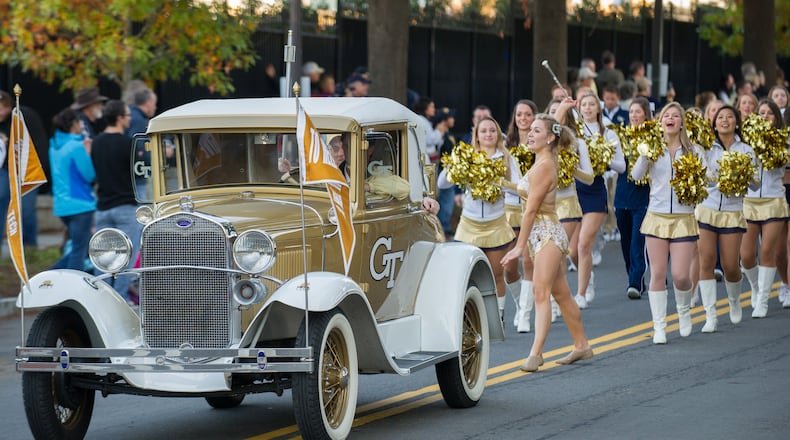Looking to college football’s premier powerhouse for new leadership, Georgia Tech hired Alabama executive deputy athletic director J Batt as its new athletic director.
Tech announced the hire Friday afternoon in a news release and said that Batt will join Tech on Oct. 24.
Batt has been at Alabama since 2017 and has been heavily involved in revenue generation as well as having oversight of several areas of internal operations, according to his bio on the Alabama athletics website.
Batt, 40, succeeds Todd Stansbury, who was dismissed after six years Sept. 26 along with football coach Geoff Collins.
“We’re excited to welcome J to Georgia Tech. His leadership experience at one of the most competitive programs in the nation and his extraordinary track record in fundraising and revenue generation will bring great value to Georgia Tech,” Tech President Ángel Cabrera said in the news release announcing the hire. “As a former ACC student-athlete, J has a keen appreciation for what it takes for students to compete at the highest level while pursuing a degree at a top academic institution. He values and shares our culture of excellence and integrity and our commitment to student well-being and success. I look forward to working with him to secure and invest the resources necessary for a successful athletics program.”
Batt emerged as the top candidate of a search that was completed in about 2-1/2 weeks, an unusually quick turnaround for an AD hire. Tech President Ángel Cabrera and interim AD Frank Neville, who led the search with assistance from Parker Executive Search, valued a strong background in football and evidently put a premium on Batt’s time with the preeminent program in the country along with his fundraising prowess.
Credit: Photo p
Credit: Photo p
Batt, who played soccer for North Carolina and was a part of its 2001 national championship team (he was a backup goalie) will be in the AD chair for the first time in his career. He is said to be an administrator with vast potential, but will have a big decision on his plate as soon as he arrives.
The primary reason for why Cabrera and Neville wanted to complete the AD search quickly was to give the new AD time to evaluate the football team and make a hire of a full-time coach to replace Collins.
Having been at Alabama since 2017, Batt likely knows Tech interim coach Brent Key, who has led the Yellow Jackets to back-to-back wins since being promoted, and certainly can get an in-depth assessment from Crimson Tide coach Nick Saban. Key was Alabama’s offensive line coach from 2016-18 before coming to Tech.
Alabama has another potential candidate on its staff in offensive coordinator Bill O’Brien, who was on the staffs of Tech coaches George O’Leary and Chan Gailey.
Undoubtedly, Batt’s fundraising experience – he oversaw the implementation of a 10-year, $600 million capital campaign – met the approval of Cabrera and Neville. Tech operates one of the smaller budgets in the ACC, both overall and for football, finished the past fiscal year with a reserve fund in a $12.1 million deficit and is slated to spend more than $13 million of its $105 million budget on debt service. Costs for this fiscal year undoubtedly will increase with the firing of Collins and the transition to a new staff.
At the Sept. 27 news conference introducing Neville and Key, Cabrera said that “I am committed to doing anything that needs to happen to return our program to the place where it belongs – among the best in our conference, among the best programs in our country” and also that he was focused on equipping the new AD “with whatever resources they need to turn this program around.”
Tech long has been accustomed to trying to make more out of less. The hire of an administrator from an athletic department that likely isn’t pinching pennies may speak to Cabrera putting action behind his words.
In the 2021 fiscal year, according to the Knight-Newhouse College Athletics Database, Tech’s athletics budget was $86.2 million, with $19.9 million spent on football. Alabama’s budget was $179.8 million with $59.5 million going to football – nearly triple Tech’s spending on the sport.
Alabama, of course, receives significantly more revenue through ESPN’s TV contract with the SEC than Tech does through the ACC’s contract with the same network and averaged almost 99,000 fans per home game at Bryant-Denny Stadium last year. Tech, meanwhile, averaged 37,733, 55th in FBS, its lowest average since 1989.
In becoming a first-time AD, Batt will have a job that encompasses far more than fundraising, though he had day-to-day leadership of the department, according to his bio. He’ll also have to become accustomed to having the final say on matters. While he has some familiarity with the ACC, having attended North Carolina and later working in its athletic department as well as Maryland’s (when it was still in the conference), he’ll have to learn the ins and outs of an athletic department and school that pride themselves on being unlike their colleagues.
As men’s basketball coach Josh Pastner put it this week at the ACC Tipoff media event, “Georgia Tech is one of the elite academic schools in the world. I think it’s the only FBS school to play football in Division I that does not have a bachelor of arts; everything is a bachelor of science.”
It seems to be a season in the ACC for hiring first-time ADs. Since 2017, Clemson (Graham Neff, a Tech grad), Duke (Nina King), Louisville (Josh Heird) and Virginia (Carla Williams, a Georgia grad) all hired first-timers, although King, Heird and Neff were promoted from within and all four took control of athletic departments that arguably were running more smoothly than Tech’s. It is not the first time Tech has looked to the SEC for an AD. Dan Radakovich was hired in 2006 after serving as the No. 2 at LSU, although he had had been the AD at American University before his time at LSU.
Batt starts the job with arguably the biggest decision he’ll make in his tenure awaiting him. Beyond that, he’ll need to support and advise the new coach and provide him with a staff salary pool and possible facilities upgrades that may have to exceed the commitments that Collins had received from Stansbury.
The renovation of the Edge Center, the centerpiece of a $125 million capital campaign led by Stansbury, is expected to begin after the end of the football season, will entail numerous moving parts (the Edge Center will be demolished) and is scheduled to last into 2025. Looming in the distance is the uncertainty surrounding the future of the ACC at a time when the SEC and Big Ten threaten to break away from the present structure.
Batt also will be charged with guiding Tech to a beneficial approach to athletes being allowed to be compensated for their name, image and likeness and likewise to making the transfer portal work for the department’s teams and coaches.
It’s a lot for an experienced AD, let alone an untested one. While Cabrera’s tenure at Tech will be judged on a far greater scope than his hire of an athletic director, his decision to go with Batt when more experienced options were available, namely Georgia State’s Charlie Cobb, will be judged. Cabrera dismissed Stansbury and Collins because the results were below standards and stated that “a new approach is necessary to return our program to where it belongs.” With his hire of Jason Michael Batt, Cabrera has placed his trust in him to initiate this new approach.
About the Author
Keep Reading
The Latest
Featured



